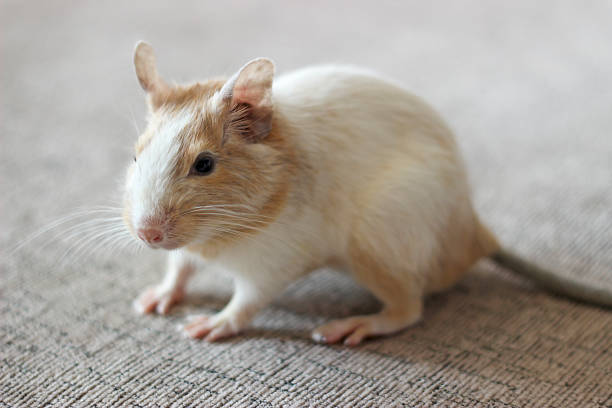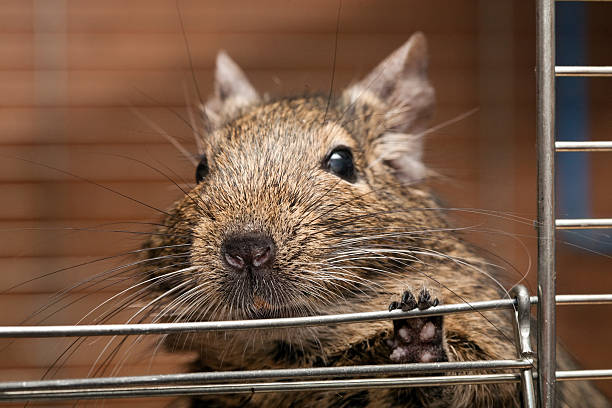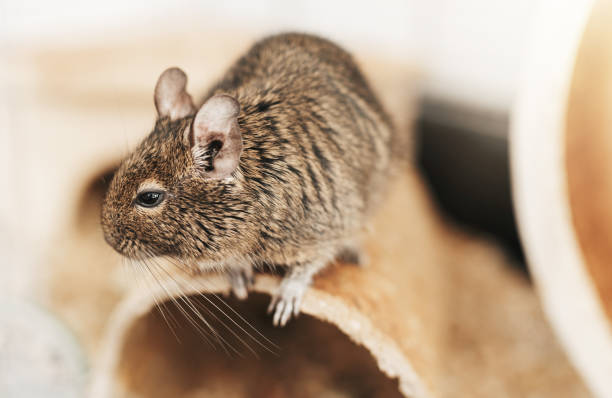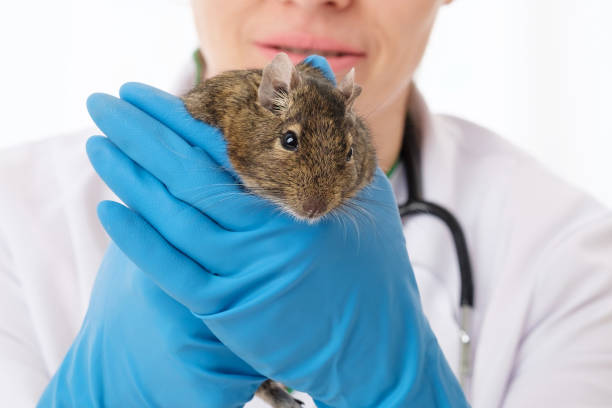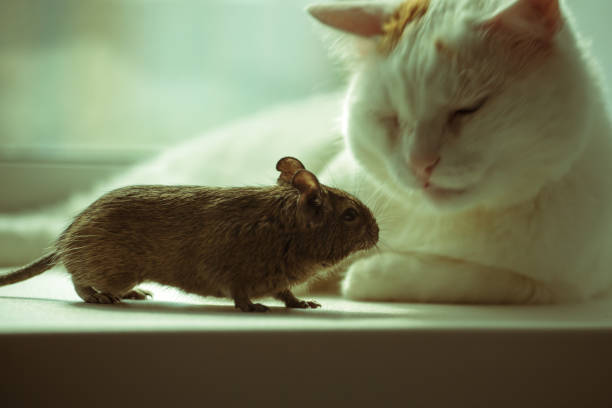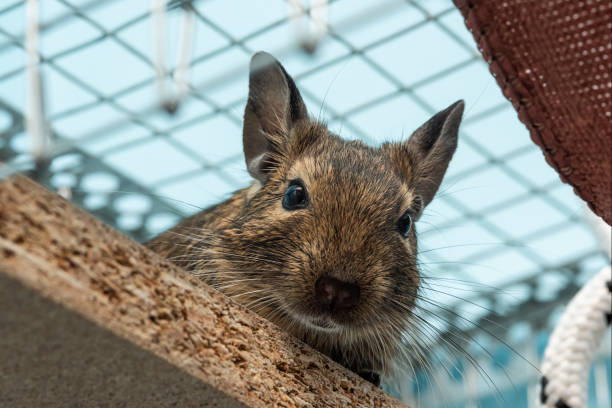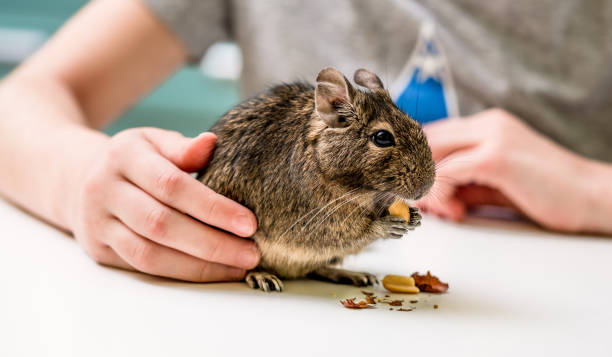Embrace the Joy: Your Degu Adoption Checklist for Happier, Healthier Companions
This post contains affiliate links. This means I will make a commission at no extra cost to you should you click through and make a purchase. Read the full disclosure here.
Adopting degus into your life is a decision filled with excitement and the promise of heartwarming companionship. These charming rodents, native to South America, have endeared themselves to countless pet owners with their lively personalities and endearing antics. However, just like any other pet adoption, bringing degus into your home requires careful consideration and preparation.
In this blog post, we’ll walk you through an essential checklist to ensure that you’re fully ready to provide a loving and nurturing environment for your new degu companions.
Research and Education
Before taking the leap into degu ownership, it’s crucial to invest time in thorough research and education. Understanding the unique characteristics, behaviors, and care requirements of degus is the first and most essential step in providing them with a happy and healthy life.
The Importance of Research
- Behavioral Insights: Delve into the world of degu behavior. Learn about their social nature, communication methods, and how they interact with each other and humans. Understanding their behavior will help you better meet their emotional needs.
- Lifespan and Commitment: Recognize that degus have a lifespan of around 6 to 8 years or even longer with proper care. This is a substantial commitment, so be prepared for the long-term responsibility.
- Legal Considerations: Check local laws and regulations regarding the ownership of degus. Some regions may have restrictions or specific requirements for keeping these animals.
Educational Resources
- Books and Websites: There are numerous books, websites, and online forums dedicated to degu care. Consider reading books on degus and joining online communities where experienced degu owners share their knowledge.
- Vet Consultation: Consult with a veterinarian who has experience in small rodent care. They can provide valuable insights into degu health and wellness.
- Talk to Degu Owners: Reach out to current degu owners to gain practical advice and firsthand experiences. They can offer tips on what to expect and share their wisdom.
Understanding Degu Needs
- Social Creatures: Understand that degus are highly social animals. They thrive in the company of other degus, so it’s advisable to adopt them in pairs or small groups.
- Chewing Habits: Recognize their need to chew on objects to keep their teeth healthy. Providing appropriate chew toys is essential.
- Nocturnal Nature: Be aware that degus are crepuscular, meaning they are most active during dawn and dusk. Adjust your schedule to accommodate their natural activity patterns.
By immersing yourself in the world of degus through research and education, you’ll be better prepared to meet their physical and emotional needs. This knowledge is the foundation for providing a loving and enriching life for your new degu friends.
Creating a Degu-Friendly Environment

Now that you’ve gained valuable insights into the world of degus through research and education, it’s time to prepare a suitable habitat for your new furry friends. A well-designed environment is key to their health, happiness, and overall well-being.
Choosing the Right Cage
- Size Matters: Select a spacious cage that provides plenty of room for your degus to move, explore, and exercise. Degus are active animals, and a larger cage is essential to support their well-being.
- Multi-Level Cage: Consider a multi-level cage with ramps and platforms to maximize vertical space. Degus love to climb and explore, and a multi-level setup will keep them engaged.
- Bar Spacing: Ensure the cage bars are appropriately spaced to prevent escapes or injury. The recommended spacing is typically around 1/2 inch (1.27 cm) to 5/8 inch (1.59 cm).
Bedding and Accessories
- Bedding Material: Use safe and appropriate bedding material such as aspen shavings or paper-based bedding. Avoid cedar or pine bedding, as they can be harmful to degus.
- Hideouts: Provide hideouts or shelters within the cage where degus can retreat when they want privacy or relaxation.
- Exercise Wheels: Invest in a solid-surface exercise wheel designed for degus. Avoid wire wheels, as they can cause injury.
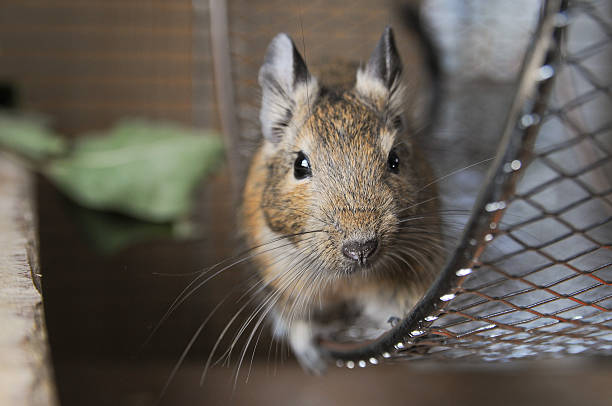
Environmental Enrichment
- Toys and Chewables: Offer a variety of toys and chewables to keep your degus mentally stimulated and to satisfy their natural chewing instincts. Wooden toys and cardboard tunnels are often favorites.
- Dust Baths: Degus require dust baths to maintain their fur and skin health. Provide a shallow container with degu-friendly chinchilla dust for them to roll in.
Placement and Temperature
- Location Matters: Place the cage in a quiet, well-ventilated area of your home away from drafts, direct sunlight, and extreme temperature fluctuations.
- Temperature Control: Maintain a comfortable room temperature for your degus, ideally between 65°F to 75°F (18°C to 24°C). Degus are sensitive to heat, so avoid exposing them to temperatures above 80°F (27°C).
Cleaning and Maintenance
- Regular Cleaning: Establish a cleaning routine to keep the cage clean and hygienic. Change bedding, wash accessories, and scrub the cage regularly to prevent odor and maintain a healthy environment.
- Health Monitoring: Use this cleaning time to observe your degus’ health and behavior. Any changes in appetite, activity levels, or physical appearance should be addressed promptly.
By creating a well-designed and degu-friendly environment, you’re setting the stage for your furry friends to thrive. .
Nutrition and Diet
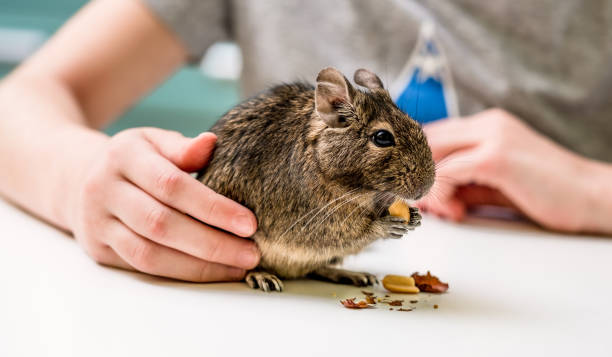
A crucial aspect of responsible degu ownership is providing a balanced and appropriate diet. Degus have specific dietary needs that must be met to ensure their health and well-being. Let’s explore the essentials of degu nutrition and how to keep your furry companions well-fed.
Understanding Degu Dietary Needs
- Hay as the Foundation: Hay is a fundamental part of a degu’s diet. It provides essential fiber for healthy digestion and keeps their teeth worn down. High-quality timothy hay is an excellent choice.
- Pellets: Offer specially formulated degu pellets that are low in sugar and fat. These provide essential vitamins and minerals. Avoid mixes with sugary treats, as degus are prone to diabetes.
- Fresh Foods: Supplement their diet with fresh vegetables and occasional fruit treats. Safe options include carrots, kale, broccoli, and apple slices. Limit fruit due to its sugar content.
- Limited Sugars and Fats: Degus are prone to obesity and diabetes, so it’s vital to limit sugary and fatty foods, including commercial treats and nuts.
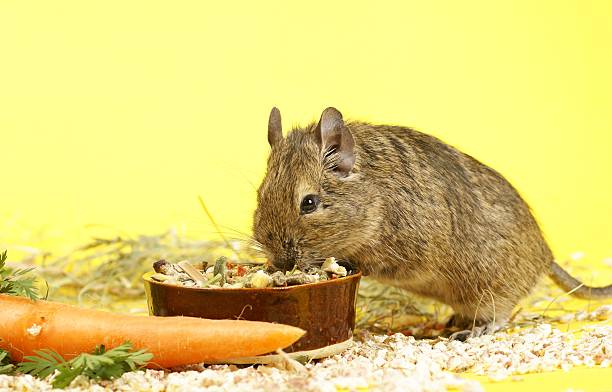
Fresh Water
- Constant Access: Ensure that fresh, clean water is available to your degus at all times. Use a water bottle with a sipper tube to prevent spills and contamination.
Feeding Schedule
- Consistency: Establish a consistent feeding schedule to regulate your degus’ eating habits. Provide fresh hay daily, pellets in measured amounts, and fresh vegetables as treats.
Avoiding Common Dietary Mistakes
- No Commercial Rodent Mixes: Avoid commercial rodent mixes that contain a variety of seeds, dried fruits, and nuts. These can lead to selective eating and dietary imbalances.
- Quality Control: Check the quality of hay, pellets, and fresh foods regularly to ensure they meet the necessary standards and are free from mold or contaminants.
- Monitor for Allergies: Watch for any signs of food allergies or intolerances in your degus, such as changes in behavior or digestive issues. Adjust their diet accordingly.
Dental Health
- Chewing Benefits: Providing appropriate chew toys and ensuring a diet rich in hay is essential for maintaining good dental health in degus. Their teeth continually grow, and chewing helps keep them in check.
Hydration
- Water Requirements: Degus don’t drink much water compared to some other animals, but it’s crucial to ensure they have access to it. Dehydration can lead to health issues.
By adhering to a well-balanced diet and following these guidelines, you’re laying the foundation for your degus to lead healthy and happy lives.
Health and Veterinary Care
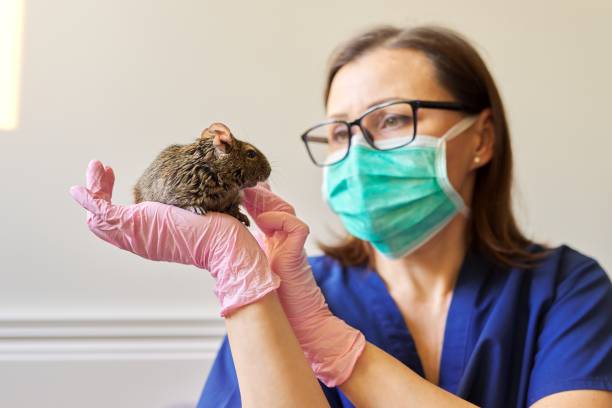
Maintaining the health of your degus is paramount to their well-being. Regular veterinary care and preventive measures are essential to ensure your furry friends lead happy and healthy lives. In this section, we’ll delve into common health concerns among degus and how to provide them with the best possible care.
Common Health Concerns
- Dental Issues: Degus’ teeth continuously grow, and dental problems can occur if they don’t have appropriate chew toys and a balanced diet. Regularly check for signs of overgrown teeth, such as drooling or difficulty eating.
- Diabetes: Degus are prone to diabetes, especially when fed a diet high in sugars and fats. Watch for symptoms like excessive thirst, increased urination, and lethargy.
- Obesity: Degus can easily become overweight. Monitor their weight and adjust their diet and exercise if necessary to maintain a healthy body condition.
- Fur Chewing and Barbering: Stress or boredom can lead to fur chewing or barbering, where degus chew or pull out their fur. Identifying and addressing the underlying causes is essential.
Veterinary Check-Ups
- Regular Examinations: Schedule regular check-ups with a veterinarian experienced in treating small rodents. These examinations can help detect health issues early.
- Vaccinations: Discuss the need for vaccinations with your vet. Depending on your degus’ environment and risk factors, vaccinations against certain diseases may be recommended.
- Parasite Control: Ensure your degus are free from external and internal parasites, such as fleas, mites, and worms. Your vet can recommend appropriate preventive measures.

Recognizing Signs of Illness
- Be Observant: Pay close attention to your degus’ behavior and appearance. Any changes in activity levels, appetite, grooming habits, or appearance should be investigated promptly.
- Respiratory Issues: Watch for signs of respiratory distress, such as sneezing, wheezing, or labored breathing. Respiratory infections can be common in degus.
Emergency Preparedness
- Emergency Kit: Have an emergency kit ready with essential supplies, including a carrier, extra bedding, food, and a list of emergency vet contacts. Quick action in emergencies can be life-saving.
Handling Stress
- Minimize Stressors: Minimize potential stressors in your degus’ environment, such as sudden loud noises, excessive handling, or overcrowding in the cage.
- Quarantine New Arrivals: If you introduce new degus into your existing group, quarantine them initially to prevent the spread of potential diseases.
Dental Care
- Chew Toys: Provide plenty of chew toys to help keep your degus’ teeth worn down. Wooden toys and safe branches from fruit trees are excellent options.
- Dental Check-ups: Schedule dental check-ups with your vet if you suspect dental issues. Dental problems can impact their ability to eat and lead to other health concerns.
By staying vigilant, providing regular veterinary care, and addressing health concerns promptly, you’ll be well-prepared to ensure the longevity and well-being of your degu companions.
Social Interaction and Enrichment
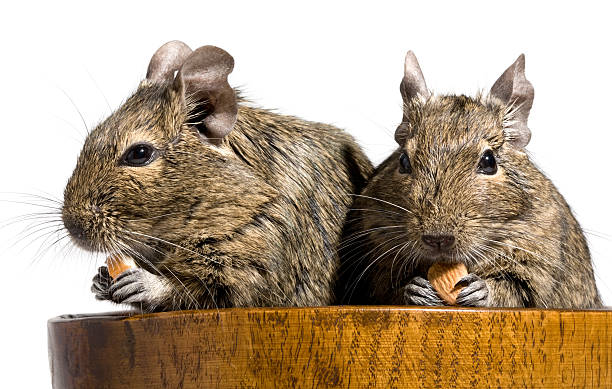
Degus are highly social and intelligent creatures that thrive on mental stimulation and social interaction. To keep your degus happy and healthy, it’s important to provide them with opportunities for enrichment and playtime. Here are seven social interaction and enrichment ideas to ensure your degus lead fulfilling lives:
Degu Companionship
- Pair or Group Housing: Degus are social animals and are best kept in pairs or small groups. Companionship is crucial for their well-being, as they groom each other, play together, and provide emotional support.
Interactive Playtime
- Free Play: Allow your degus out of their cage for supervised free playtime in a secure and degu-proofed room. Ensure there are no electrical cords or hazards, and closely monitor their activities.
- Obstacle Course: Create a mini obstacle course with tunnels, bridges, and platforms for your degus to explore. This can mimic their natural instinct to climb and explore.
- Hide-and-Seek: Hide treats or small toys around their play area and watch them engage in a playful game of hide-and-seek as they search for hidden treasures.
Toys and Chewables
- Wooden Toys: Degus love to chew, so provide wooden toys and blocks for them to gnaw on. These also help keep their teeth healthy.
- Cardboard Tunnels: Degus enjoy crawling through tunnels. Cardboard tubes from paper towels or toilet paper rolls can make great, disposable tunnels.
Social Interaction with You
- Gentle Handling: Spend time bonding with your degus through gentle handling and stroking. Gradually build trust by allowing them to come to you on their terms.
Playful Treats
- Frozen Treats: Offer frozen fruits like small pieces of apple as a treat. Degus enjoy nibbling on these, and the cold treat can be particularly refreshing.
Rotating Toys
- Variety Matters: Rotate their toys and accessories regularly to keep their environment interesting. New items can pique their curiosity and prevent boredom.
Providing opportunities for social interaction and mental stimulation is essential for your degus’ mental and emotional health. These activities not only keep them physically active but also strengthen the bond between you and your furry companions.
Creating the Perfect Home: A Guide to Degu Habitat Setup
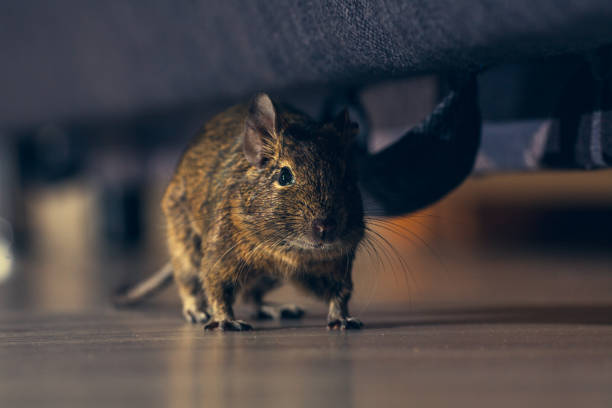
The quality of your degus’ living environment plays a significant role in their overall health and happiness. A well-designed and safe habitat is essential for your furry companions to thrive. Let’s explore the key aspects of setting up the perfect home for your degus.
Choosing the Right Cage
- Size Matters: Select a spacious cage that provides plenty of room for your degus to move, explore, and exercise. Degus are active animals and need ample space to stay happy and healthy.
- Multi-Level Cage: Consider a multi-level cage with ramps, platforms, and tunnels to maximize vertical space. Degus enjoy climbing and exploring, and multi-level setups cater to their natural instincts.
- Bar Spacing: Ensure the cage bars are appropriately spaced to prevent escapes or injuries. The recommended spacing is typically around 1/2 inch (1.27 cm) to 5/8 inch (1.59 cm).
Bedding and Accessories
- Bedding Material: Use safe and appropriate bedding materials, such as aspen shavings or paper-based bedding. Avoid cedar or pine bedding, as they can be harmful to degus.
- Hideouts: Provide hideouts or shelters within the cage where degus can retreat when they want privacy or relaxation.
- Exercise Wheels: Invest in a solid-surface exercise wheel designed for degus. Avoid wire wheels, as they can cause injury.
Environmental Enrichment
- Toys and Chewables: Offer a variety of toys and chewables to keep your degus mentally stimulated and to satisfy their natural chewing instincts. Wooden toys and cardboard tunnels are often favorites.
- Dust Baths: Degus require dust baths to maintain their fur and skin health. Provide a shallow container with degu-friendly chinchilla dust for them to roll in.
Placement and Temperature
- Location Matters: Place the cage in a quiet, well-ventilated area of your home away from drafts, direct sunlight, and extreme temperature fluctuations.
- Temperature Control: Maintain a comfortable room temperature for your degus, ideally between 65°F to 75°F (18°C to 24°C). Degus are sensitive to heat, so avoid exposing them to temperatures above 80°F (27°C).
Cleaning and Maintenance
- Regular Cleaning: Establish a cleaning routine to keep the cage clean and hygienic. Change bedding, wash accessories, and scrub the cage regularly to prevent odor and maintain a healthy environment.
- Health Monitoring: Use this cleaning time to observe your degus’ health and behavior. Any changes in appetite, activity levels, or physical appearance should be addressed promptly.
Safety Considerations

- Degu-Proofing: Degus are excellent chewers, so ensure that the cage and its accessories are free from any toxic materials. Remove or secure potential hazards in their play area.
- Escape-Proof: Check the cage for any openings or weak spots that could allow your degus to escape. Degus are nimble and can find their way out of small gaps.
By providing a spacious and enriching habitat, you’re setting the stage for your degus to lead happy and fulfilling lives.
Final Thoughts
Throughout this comprehensive guide to degu care and well-being, we’ve explored every aspect of providing a happy and healthy life for these remarkable rodents. From understanding their unique needs to creating the perfect environment and ensuring their nutrition and health, you’re now equipped with the knowledge and tools to be an excellent degu owner.
As you navigate the joys and responsibilities of degu ownership, remember that every effort you make to provide a loving and nurturing environment will be rewarded with the companionship and affection of these endearing creatures.

